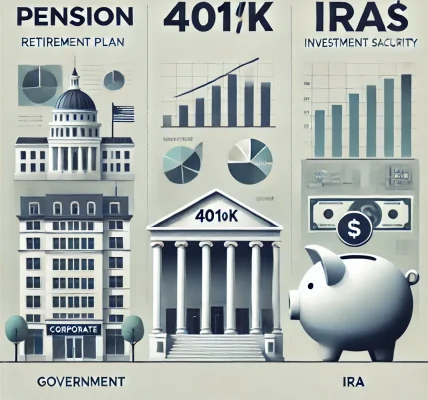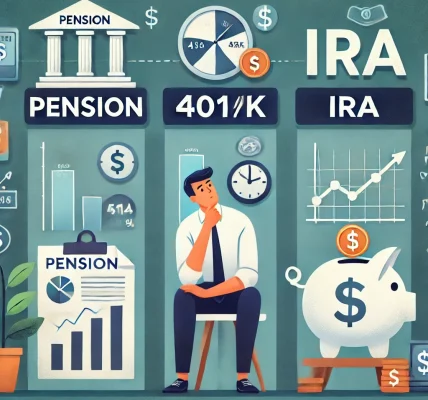Retirement planning is often overlooked until later in life, but starting early can make a significant difference in achieving financial freedom. By planning ahead, you can ensure a comfortable and stress-free retirement without financial worries. This guide will explore the benefits of early retirement planning, key strategies to follow, and how to build a solid financial future.
Why Early Retirement Planning is Essential
1. Power of Compound Interest
One of the most compelling reasons to start retirement planning early is the power of compound interest. The earlier you invest, the more time your money has to grow. Compound interest allows your investments to earn returns not just on the initial principal but also on accumulated interest over time.
2. Lower Financial Stress
Early planning ensures that you are financially prepared for retirement, reducing stress and uncertainty about your future. It allows you to make well-informed decisions without rushing into last-minute savings.
3. More Investment Options
Starting early provides flexibility in choosing different investment vehicles. Whether it’s stocks, bonds, mutual funds, or real estate, an early start allows you to diversify your portfolio effectively.
4. Higher Savings Accumulation
With more time on your side, you can accumulate larger savings by making smaller contributions over a longer period rather than trying to save large amounts in a short time.
5. Tax Advantages
Certain retirement plans offer tax benefits that can maximize your savings. Contributing early to tax-advantaged accounts such as a 401(k) or an IRA helps reduce taxable income and allows your investments to grow tax-free or tax-deferred.
Key Strategies for Early Retirement Planning
1. Set Clear Retirement Goals
Determine at what age you want to retire and estimate the lifestyle you desire post-retirement. Factor in expected expenses, inflation, healthcare costs, and travel or hobbies.
2. Create a Retirement Budget
Understanding your current and future expenses will help in calculating how much money you need to save. Consider:
- Daily living expenses
- Healthcare costs
- Travel and leisure activities
- Unexpected expenses
3. Start Investing in Retirement Accounts
Employer-Sponsored 401(k) Plans
- Many employers offer 401(k) plans with matching contributions. Always contribute enough to get the full employer match, as it’s essentially free money.
Individual Retirement Accounts (IRA)
- Traditional IRA: Contributions may be tax-deductible, and taxes are paid on withdrawals during retirement.
- Roth IRA: Contributions are made with after-tax income, but withdrawals during retirement are tax-free.
4. Diversify Your Investments
Investing in different asset classes helps balance risk and return. A well-diversified portfolio may include:
- Stocks for long-term growth
- Bonds for stability
- Mutual funds for diversification
- Real estate for passive income
5. Automate Savings and Contributions
Setting up automatic contributions to your retirement accounts ensures consistent savings without the temptation to spend the money elsewhere.
6. Minimize Debt and Manage Expenses Wisely
Paying off high-interest debts such as credit cards or personal loans early in life helps free up more funds for retirement savings. Budgeting and cutting unnecessary expenses also contribute to financial stability.
7. Consider Passive Income Sources
Investing in rental properties, dividend stocks, or creating online businesses can generate additional income streams for retirement.
8. Regularly Review and Adjust Your Plan
Economic conditions, market performance, and personal circumstances change over time. Regularly reviewing your retirement plan helps you stay on track and make necessary adjustments.
Common Mistakes to Avoid in Retirement Planning
1. Delaying Savings
Many people believe they have plenty of time to start saving. However, the longer you wait, the more you need to save later in life to reach the same retirement goal.
2. Not Taking Advantage of Employer Matching
If your employer offers a 401(k) match, not contributing enough to get the full match is leaving free money on the table.
3. Relying Solely on Social Security
Social Security benefits are designed to supplement retirement income, not replace it entirely. Relying solely on it may not be enough to sustain your desired lifestyle.
4. Failing to Diversify Investments
Putting all your money into one type of investment increases risk. A well-diversified portfolio ensures long-term stability and growth.
5. Ignoring Inflation
The cost of living increases over time. Not factoring in inflation can lead to a shortfall in retirement funds.
6. Cashing Out Retirement Savings Early
Withdrawing from retirement accounts before the designated age may result in penalties and lost growth potential.
Conclusion
Early retirement planning is the key to financial freedom and a stress-free retirement. By taking proactive steps today, you can ensure a comfortable and secure future. Investing wisely, minimizing debt, and leveraging tax-advantaged retirement accounts will put you on the right path to financial independence. The sooner you start, the easier it will be to achieve your retirement goals. Start planning today and enjoy the benefits of a well-prepared financial future!




